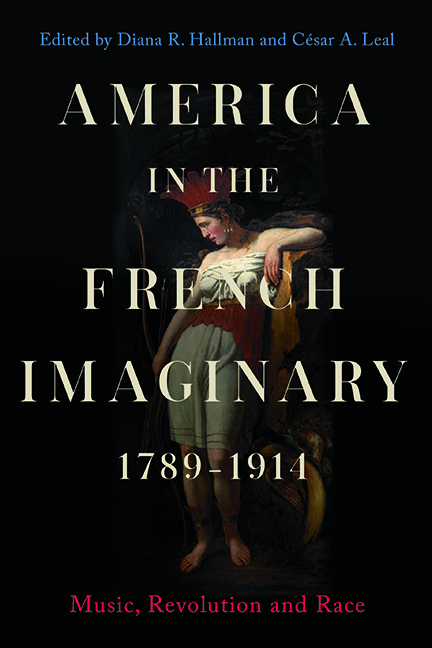Book contents
- Frontmatter
- Dedication
- Contents
- List of Illustrations
- List of Music Examples
- List of Abbreviations
- Editorial Notes
- List of Contributors
- Acknowledgements
- Preface
- Introduction
- Part I American liberté, sauvagerie and esclavage
- Part II Myths of America and Intersecting Identities
- Part III Soundscapes and Sonic Fantasies
- Part IV America, Commodification and Race at the fin de siècle
- Bibliography
- Index
- Music in Society and Culture
4 - ‘Brise du Sud’: American Identity and War in the Popular Sheet Music of Francophone New Orleans
Published online by Cambridge University Press: 15 September 2022
- Frontmatter
- Dedication
- Contents
- List of Illustrations
- List of Music Examples
- List of Abbreviations
- Editorial Notes
- List of Contributors
- Acknowledgements
- Preface
- Introduction
- Part I American liberté, sauvagerie and esclavage
- Part II Myths of America and Intersecting Identities
- Part III Soundscapes and Sonic Fantasies
- Part IV America, Commodification and Race at the fin de siècle
- Bibliography
- Index
- Music in Society and Culture
Summary
For the Francophone population of nineteenth-century New Orleans, imagining America meant doing so from the inside. It was not simply a matter of escapism, fantasy, or even entertainment: the city's French-speaking residents negotiated their own identity through a process of creating and projecting images of their adoptive homeland. New Orleans's Francophones had been a heterogeneous group from the city's foundation in 1718; the earliest residents were a heady mixture of convicts, nuns, and a few aspiring capitalists. Over the next century, the Francophone population diversified further, coming to comprise people from highly varied economic and racial backgrounds, born on both sides of the Atlantic. Francophone identity in the city, insofar as it can be thought of in the singular, emerged less from a unified sense of heritage than from sets of experiences in the New World shared by French speakers.
By the early nineteenth century, music had come to play an important role in articulating Francophone cultural identity in New Orleans. Francophone theatres in the city produced French-language operas from as early as 1796, and the opening of the Théâtre d’Orléans in 1819 helped to establish transatlantic networks of performers and other connections that would grow over the next forty years. Later, a new French Opera House provided a dedicated home for Francophone opera from 1859 until 1919, when the building burned down.
In private and semi-private spaces, too, music helped to create a sense of Francophone identity. Growing piano sales and an emerging sheet music market made the parlour a significant site of musical activity. The soirée musicale, where families and invited guests would spend an evening in domestic musical performance and appreciation, was a fundamental part of middle-class social life for French speakers, and music shops around the city proudly published lists of the latest shipments of sheet music and instruments they had received from Paris, knowing that they provided important material for these musical-social gatherings.
My focus in this chapter, however, is not on imported music, but rather on a much smaller but no less significant body of works that were written in New Orleans by Francophone composers. Some of the composers I consider here were Creoles – locally born people of European descent – but had in many cases been educated in Paris.
- Type
- Chapter
- Information
- America in the French Imaginary, 1789-1914Music, Revolution and Race, pp. 149 - 171Publisher: Boydell & BrewerPrint publication year: 2022

